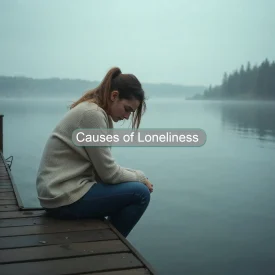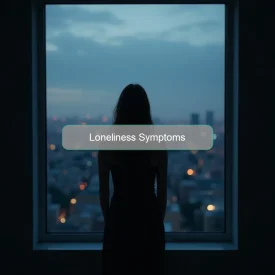Loneliness happens to everyone at some point. It’s that empty feeling when you want connection but don’t have it. The good news is you can deal with it by taking small steps like reaching out to others, caring for yourself, and trying new activities.
Start by accepting your feelings – it’s normal and okay. Then, focus on building habits that bring people into your life. This can lower stress and boost your mood right away.
For a deeper understanding of the meaning of loneliness, it often happens when you feel disconnected, even if you are near other people.
Key Takeaways:
- Loneliness is normal—accept it and take easy steps like chatting with a friend or self-care to feel more connected.
- Build real bonds by joining clubs, volunteering, or using apps to create belonging and reduce isolation.
- Engage in hobbies, consider a pet, or try mindfulness for purpose, better mood, and relief from lonely feelings.
- Recognize risks like stress or depression, and seek therapy if persistent to prevent long-term issues.
- Tailor strategies to your life stage or situation, such as after a loss, for routines that provide ongoing support.
Practical Ways to Deal with Loneliness
Here are some practical ways to deal with loneliness. These steps can help you feel more connected. Start with one or two that seem easy for you, and build from there. To better address it, learn about the causes of loneliness and tailor your approach

Building Stronger Social Connections
Building stronger social connections is a key way to combat loneliness, as it fosters feelings of belonging, provides emotional support, and can even reduce health risks like inflammation and early death.
- Reach out to old friends or family. A quick call or message can help rebuild ties. Try video chats for a personal touch.
- Join a local group or club. This could be a book club or walking group. It makes meeting people easier.
- Volunteer your time. Helping others gives you purpose and new friends. Pick a cause you like.
- Talk to strangers in safe spots. Smile and say hi at a park or store. Small talk can lead to friendships.
- Open up about your feelings. Share with trusted people how you feel. It can deepen bonds.
Self-Care Practices to Combat Loneliness
Self-care builds inner strength and helps you handle loneliness better by focusing on your well-being.
- Take care of your body. Eat well, sleep enough, and exercise. It boosts energy and reduces stress.
- Practice gratitude. Write down three good things each day. It shifts focus to positives and lifts mood.
- Be kind to yourself. Read a book or listen to music alone. It can feel comforting and nurturing.
- Try mindfulness. Sit with your emotions without judgment. It helps you accept feelings and stay present.
- Create a cozy space. Organize your home to feel warm. It makes alone time more enjoyable.
- Take a relaxing bath. Or enjoy comfort food mindfully. These small acts promote self-compassion.
Engaging in Hobbies and Activities
Hobbies keep your mind busy, boost happiness, and reduce loneliness by giving you purpose and focus.
Try something new like painting, gardening, or cooking. These creative activities distract you from lonely thoughts and release feel-good chemicals that reduce stress.
Restart an old hobby, like playing music or hiking, to bring back joy and passion. This can improve your well-being and lower stress over time.
Set small goals, like finishing a project each week. Achieving them gives a sense of accomplishment and keeps you engaged.
Choose activities that fully absorb your attention. Entering a “flow” state helps you forget loneliness and improves mental health over time.
Using Technology for Support
Technology can help you connect with others from home and reduce feelings of isolation, but it’s important to use it in a balanced way to get the most benefits. For innovative options, consider an AI girlfriend—learn What is an AI girlfriend and how it can provide virtual companionship to ease loneliness.
Use apps to connect with loved ones. Video calls on different platforms keep you close to family and friends, even if they’re far away. This can make you feel more supported and less alone.
Join online groups or forums. Building these virtual bonds can lead to real friendships and ease loneliness.
Explore apps designed for social connection. They provide simple ways to build habits that fight isolation.
Listen to podcasts or online radio. These can give you a sense of company without needing interaction. Choose topics you enjoy to make your day feel fuller and more engaging.
But limit screen time. Too much online activity can sometimes make loneliness worse by replacing face-to-face talks. Balance it with offline activities to stay healthy and connected.
Considering Pet Companionship
Pets can be great companions, offering love and reducing loneliness through daily interaction and care. Having a dog or cat adds routine to your life with feeding, playing, and grooming, making days more meaningful.
Walking a pet gets you outside and helps you meet people, as dogs often start conversations. Pets lower stress and boost mood by providing affection and support, easing anxiety and loneliness.
Simple activities like holding your pet release feel-good hormones, benefiting seniors and those living alone. Just pick a pet that suits your lifestyle for the best experience.
Handling Loneliness in Different Situations
Loneliness is a common experience that can feel different depending on where you are in life or the situation you’re facing. Understanding the context of your loneliness helps you find the best way to cope.
It can happen in your relationships, at work, or when living alone, and tailored approaches make a real difference. Below are some practical tips for handling loneliness in key areas of life.
Loneliness in Relationships and Family Life
Loneliness can happen despite being close to loved ones when emotions feel disconnected. Start by talking honestly about your feelings and needs without blame, and listen to others.
Spend quality time together through activities like family dinners, walks, or games to rebuild bonds.
Also, connect with friends or extended family to widen your support network.
If loneliness continues, consider couples or family counseling to improve communication and relationships.
Dealing with Loneliness After Loss or Change
Loss or big changes can cause deep loneliness, but giving yourself time to heal and seeking support can help. Allow yourself to grieve and accept your feelings; it’s normal to feel sad, angry, or empty. Healing takes patience, so be gentle with yourself.
Consider joining support groups with others who have similar experiences to find comfort and reduce isolation. Build new routines, like daily walks or hobbies, to bring structure and shift your focus toward positive growth.
Stay connected by reaching out to friends or family for regular check-ins, even brief ones, to ease loneliness. Practice gratitude by noting small things you appreciate each day, which can improve your mood and lessen feelings of loneliness.
Loneliness at Various Life Stages (Teens, Adults, Seniors)
Teens often face loneliness during big changes like school shifts or peer issues. Join school clubs or sports teams to meet others with shared interests. Talk to a trusted adult, like a parent or teacher, for support and advice. Try helping others through volunteering, which can build connections and boost your mood.
Adults may feel lonely due to work demands or life routines. Balance work and friends by scheduling regular meetups or calls. Make time for fun activities like hobbies or outings to recharge and prevent burnout. Consider peer support groups or talking therapies if feelings persist.
Seniors can experience loneliness from retirement or the loss of loved ones. Stay active in the community through events or volunteering to form new bonds. Use senior centers for classes and social gatherings that keep you engaged. Keep in touch with family via phone or visits, and learn simple tech for online connections.
Workplace and Everyday Loneliness
Loneliness at work or in daily routines can catch you off guard, but small actions can help. Chat with coworkers about shared interests or plans to build connections and make the workplace friendlier.
Join work events like team lunches or virtual coffee breaks to bond with colleagues and reduce isolation. Set daily goals to stay focused and busy, which boosts accomplishment and leaves less room for lonely thoughts.
The Effects of Loneliness on Your Life
Loneliness does more than make you feel sad or isolated. It can harm your mental and physical health in serious ways.
Understanding these effects shows why dealing with loneliness and building connections matters.

Impact on Mental Health
- Loneliness often leads to depression and anxiety. Your stress levels can rise, making it hard to sleep well. Over time, this can make everyday tasks feel overwhelming.
- You might start feeling hopeless or worthless. Negative thoughts can take over, affecting your mood and outlook. It’s common to withdraw more, which worsens the cycle.
- Long-term loneliness links to bigger issues like suicidal thoughts or dementia. It can also tie into problems like alcohol abuse or personality changes. Addressing it early prevents it from growing.
Physical Health Risks from Chronic Loneliness
- Chronic loneliness raises your risk of heart disease by about 29% and stroke by 32%. It triggers ongoing stress that leads to inflammation and higher blood pressure.
Over time, this damages blood vessels and increases cardiovascular problems.
- It weakens your immune system, making you more prone to colds, infections, or even slower healing. Higher levels of stress hormones like cortisol suppress immune responses.
This leaves your body less able to fight off illnesses.
- Loneliness can cause high blood pressure and disrupt sleep patterns. Poor rest adds to fatigue, weight gain, and other health issues.
Addressing loneliness early helps lower these risks and improves overall well-being.
Social and Emotional Consequences
Loneliness makes it harder to trust others, leading to weakened relationships and more withdrawal from social circles. Emotions can feel overwhelming, turning small issues into big stresses and draining daily joy and motivation.
Over time, this can contribute to deeper problems like depression and anxiety, affecting how you connect with people
When and How to Seek Help for Loneliness
You don’t have to face these feelings alone. Support is available, and reaching out can make a big difference in your well-being.
Signs You Need Professional Support
If loneliness feels overwhelming and impacts your daily life, these signs may indicate it’s time to get expert help. Check out common loneliness symptoms like persistent sadness or withdrawal for more insights.
- Constant sadness or worry. Lasts most days.
- Physical pains like headaches. Sleep changes.
- Feeling isolated even with people around.
Types of Therapy and Counseling Options
Several types of therapy and counseling can help you deal with loneliness by providing tools and support.
Cognitive Behavioral Therapy (CBT) works by changing negative thoughts and patterns that contribute to your feelings, helping you develop healthier ways of thinking.
Talk therapy, also known as psychotherapy, offers a safe space to share your emotions and experiences with a trained professional who listens without judgment.
Group therapy brings together people facing similar challenges, like loneliness, allowing you to connect, share stories, and feel less alone through mutual understanding and encouragement.
Preventing Loneliness Long-Term
Preventing loneliness long-term involves building strong, meaningful connections and maintaining regular social contact. Dealing with loneliness early helps stop feelings from becoming overwhelming or chronic.

Establishing healthy routines, such as weekly meetups or hobbies, keeps you engaged and connected with others. It’s important to reach out for support when needed and to communicate openly about your feelings.
Fostering positive relationships and staying socially active creates a lasting sense of belonging. Practicing self-care and staying mindful of your emotional needs also plays a key role in dealing with loneliness effectively over time.
Final Thoughts on Dealing with Loneliness
You don’t have to face loneliness alone. Small steps add up to big changes. Reach out, care for yourself, and build connections. Over time, you’ll feel more supported and happy. Remember, it’s okay to ask for help when dealing with loneliness – that’s a strong move.
Frequently Asked Questions
How Can I Overcome Loneliness Quickly?
Start with small, easy steps to feel better right away. Call or message a friend or family member to connect, even if just for a short chat. Remember, reaching out and doing something small to care for yourself helps reduce loneliness quickly.
Does Social Media Help or Hurt Loneliness?
It can help connect. But too much hurts if it replaces real talks. Use it wisely. Limit time, focus on real bonds.
What If I’m Introverted but Still Feel Lonely?
Introverts need time alone but also need good connections. Try small groups or one-on-one chats that feel comfortable. Balance your quiet time with meaningful relationships to ease loneliness.





